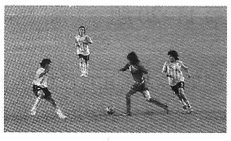
下载APP

举一反三

【多选题】剩余价值( )。
A.
是工人在剩余劳动时间创造的并被资本家无偿占有的价值
B.
是生产资料的自然报酬
C.
体现了资本家对工人的剥削关系
D.
是资本主义生产的根本目的
【单选题】72() A. and B. or C. neither D. so
A.
In an age of perpetual digital connectedness, why do people seem so disconnected In a Duke University study, researchers found that from 1985 to 2004, the (62) of people who said there was no one with whom they discussed important matters tripled, to 25%; the same study found that (63) , Americans had one-third (64) friends and confidants than they did two decades ago.
B.
Another recent study, by researchers at the University of Michigan, found that college students today have (65) less empathy--the ability to understand and (66) the feelings of another-- than students of generations past did. The reason, psychologists (67) , may have something to do with our increasing (68) on digital communication and other forms of new media.
C.
It’s possible that instead of (69) real friendships off-fine, e-mail and social networking may take the place of them--and the distance (70) in screen-only interactions may breed feelings of isolation or a tendency to care less about other people.
D.
The problem is, (71) empathy recedes, (72) does trust. And (73) trust, you can’t have a cohesive society. (74) the findings of a new study co-authored by Kevin Rockmann of George Mason University and Gregory Northcraft, a professor of executive leadership at the University of Illinois. Northcraft says high-tech communications like e-mail and videoconferencing strip away the personal interaction needed to (75) trust. In a business setting--as in all other social relationships outside the workplace--trust is a necessary (76) for effective cooperation within a group.
E.
In Rockmann and Northcraft’s study, 200 students were divided into teams and asked to manage two (77) projects, one having to do with nuclear disarmament (裁军); the other, price fixing. Some groups (78) via e-mail, some via videoconference and others face to face. In the end, those who met in (79) showed the most trust and most effective cooperation; those using e-mail were the (80) able to work together and get the job done.
F.
Northcraft thinks this is because real-life meetings, during which participants can see how engaged their colleagues are, breed more trust. Over e-mail, (81) confirmation of hard work gets lost, which tends to encourage mutual slacking off (懈怠).




 A.
A.




